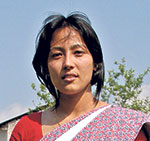Sangina Baidya is the first Nepali athlete to formally qualify and become the nation’s first ever taekwondo player at the 2004 Summer Olympics in Athens. She won a gold medal at the 12th Asian Taekwondo Championship, in Melbourne, Australia in 1996 and earned applauds as the finest Nepali taekwondo player.
Baidya further won gold medal at the 8th SAF Games held in Kathmandu in 1999 followed by another gold medal at the 9th SAF Games held in Pakistan in 2003. Though she fractured her right leg in an accident in 2003, she did not give up even after being bed ridden for eight months. She continued pushing herself and finally succeeded to qualify in the 2004 Summer Olympics.
After her retirement from sports career in 2009, she started training young players, and recently coached the Nepal Army Team and National Taekwondo Association. My City’s Sonam Lama caught up with Baidya to reminisce her progressive journey as a taekwondo player.
Eight taekwondo players to compete in India open


What inspired you to choose your way to sports?
Seeing boys play various games in school, I also started playing volleyball, long and high jump. My interest in sports deepened when I started winning gold medals in inter-school competitions. After completing my School Living Certificate (SLC), I moved to Kathmandu for studies. But my interest in sports eventually led me to the sports world. Moreover, it was my high reverence for Bruce Lee and his struggles that further inspired me to make a go in sports.
What is the difference between national and international sports scenes?
Nepali players prove to be strong contenders in the sense that we have strived to achieve something at the cost of putting other important matters at stake. Many international players rarely go through the struggles and hardships that the players in our country are likely to suffer. When I put myself on that stance, the struggle from an ordinary sports enthusiast to a national player was not easy at all. There may appear certain disparity in our training processes when we are pitted against international players, however, the strength and dedication that a player employs does not differ vastly.
You said there were a negligible number of female players when you started playing taekwondo, how did people respond to you being a national player?
At the initial stage of my career in sports, my family was not ecstatic with the idea that I chose sports over my studies. However, I did not lose hope and kept moving until my family was convinced of my dedication. People used to look at me with disbelief because they thought this field is ruled by men. But within the sports field, I never faced any discrimination on the basis of my gender. It was because most of the friends and mentors that I played with and learned from probably judged the player in me.
Now that you are training young taekwondo players, how challenging do you find the experience?
I think working as a coach is more challenging than being a player. As a coach, your responsibility doubles in the sense that you have to be their physical and psychological instructor at the same time. Paying attention at the rules and playing well won’t suffice, but you will also need to pay heed to the players’ individualistic strength and monitor it accordingly in order to form a strong team for national and international competitions.
Would you like to convey any word of advice to our readers?
As females, we are confined by the gender defined roles. But to take Nepali sports to the next level, it is fundamental that we overcome such notions on role divisions. Divisions as per the interest level seem reasonable rather than any such based on biological and social terms. With youths flying abroad in high number, it has been affecting the country to a greater extent. And it is through improvising the systems that we can stop the country’s brain drain. Sports have all it takes for a person to grow physically, psychologically and financially. And it provides exposure to those who explore the field with utmost vision and ambition.





































